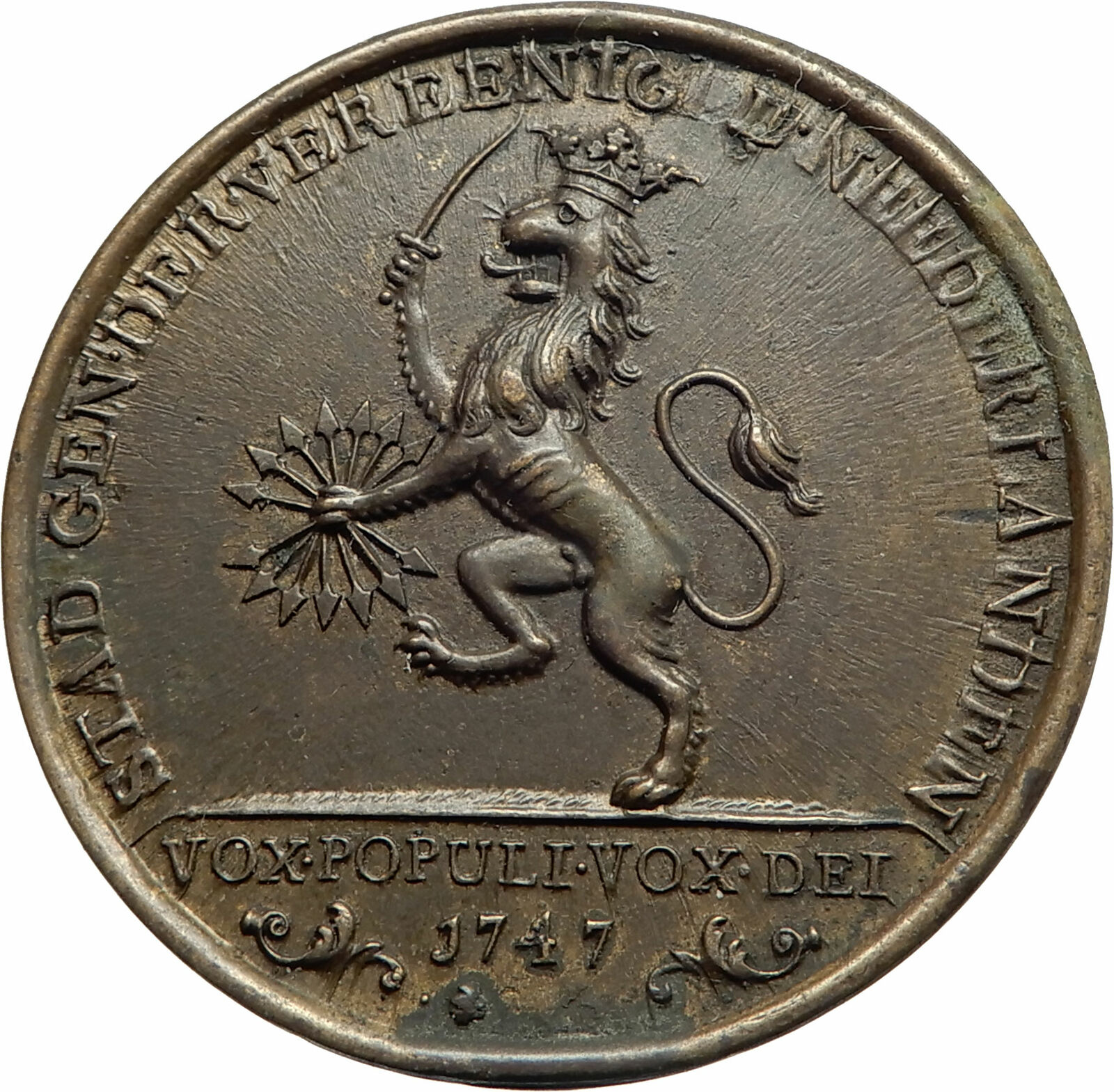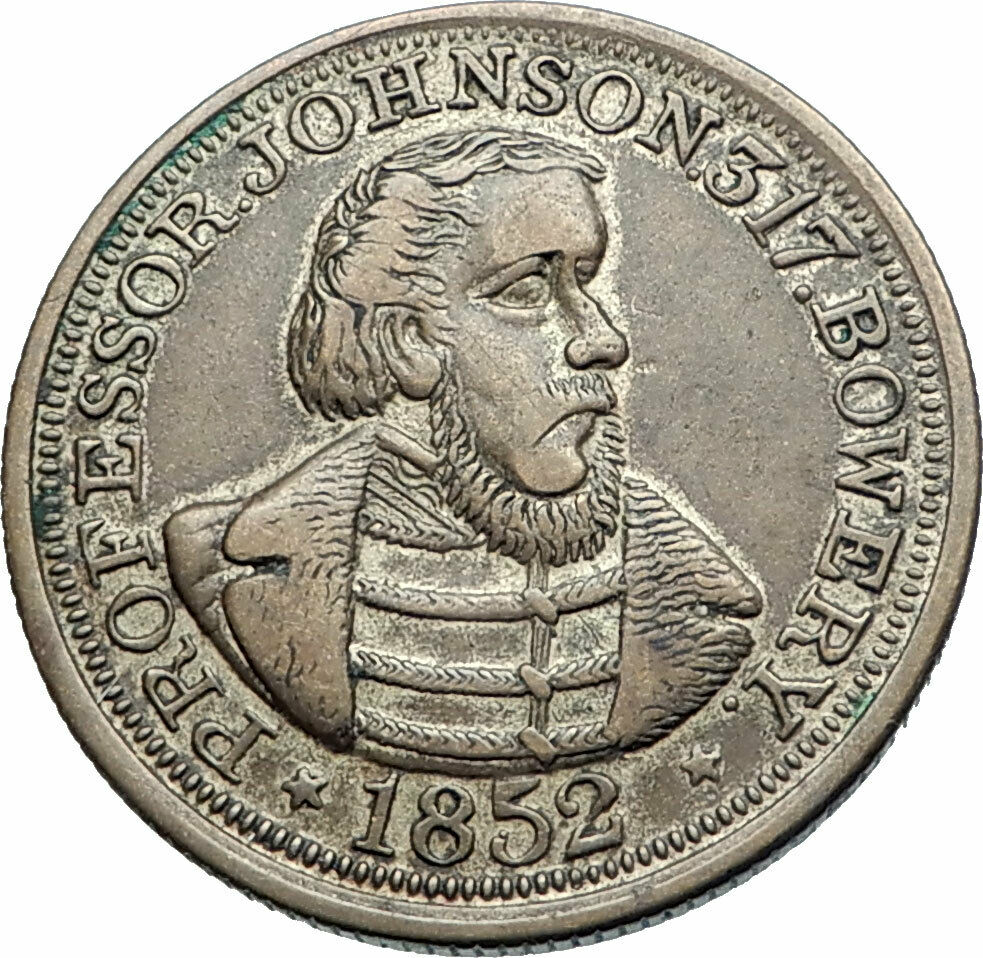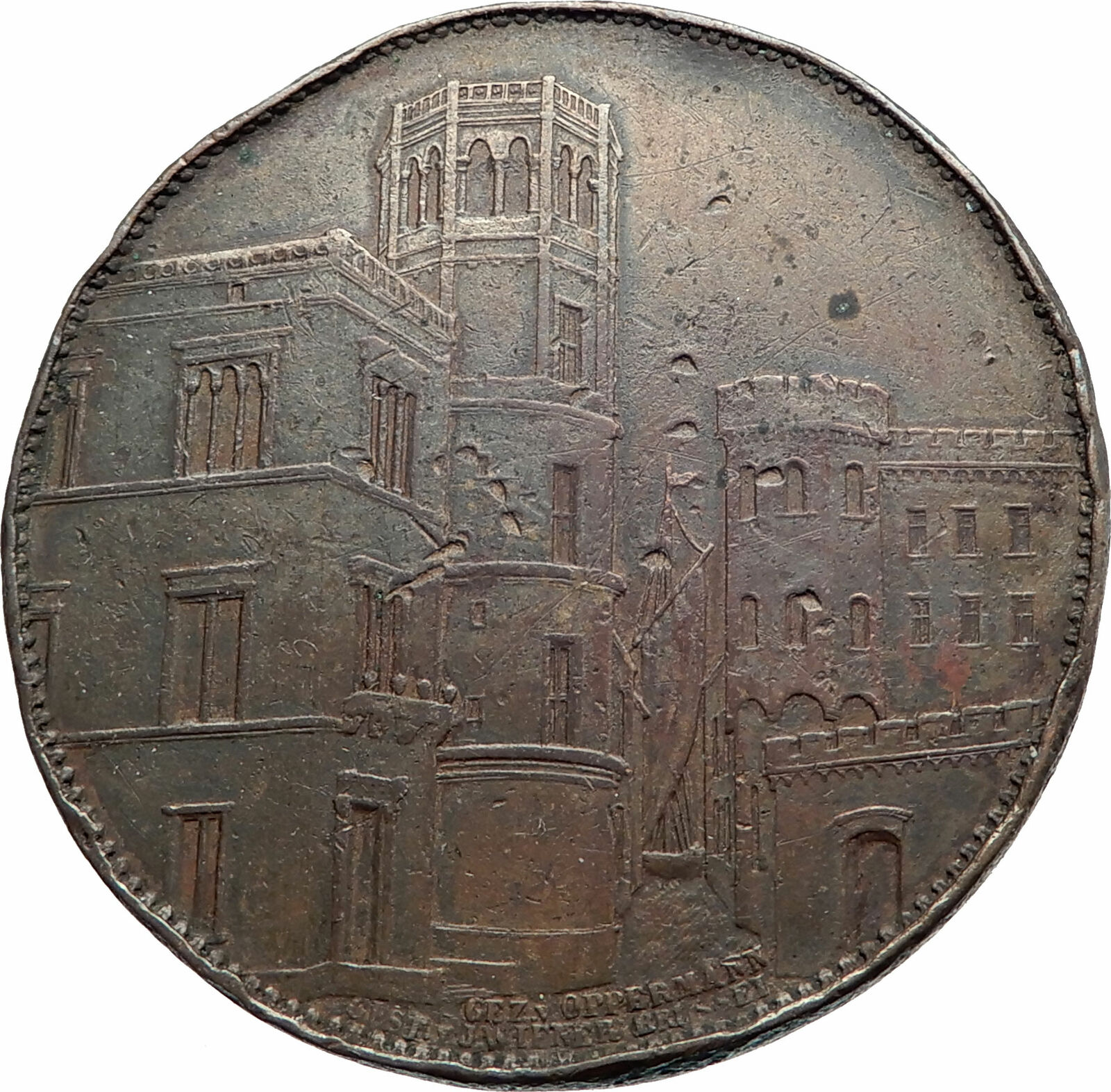|
Russia
Nicholas I and Alexander II (Liberator)
Award Medal, 33 x 27mm. (11.02 grams) Made circa 1856
Monograms of Nicholas I and Alexander II
You are bidding on the exact item pictured, provided with a Certificate of Authenticity and Lifetime Guarantee of Authenticity.
 Nicholas I (Russian: Николай I Павлович, tr. Nikolay I Pavlovich; 6 July [O.S. 25 June] 1796 – 2 March [O.S. 18 February] 1855) was the Emperor of Russia from 1825 until 1855. He was also the King of Poland and Grand Duke of Finland. He is best known as a political conservative whose reign was marked by geographical expansion, repression of dissent, economic stagnation, poor administrative policies, a corrupt bureaucracy, and frequent wars that culminated in Russia’s defeat in the Crimean War of 1853-56. His biographer Nicholas V. Riasanovsky says that Nicholas displayed determination, singleness of purpose, and an iron will, along with a powerful sense of duty and a dedication to very hard work. He saw himself as a soldier-a junior officer totally consumed by spit and polish. A handsome man, he was highly nervous and aggressive. Trained as an engineer, he was a stickler for minute detail. In his public persona, says Riasanovsky, “Nicholas I came to represent autocracy personified: infinitely majestic, determined and powerful, hard as stone, and relentless as fate.” His reign had an ideology called “Official Nationality” that was proclaimed officially in 1833. It was a reactionary policy based on orthodoxy in religion, autocracy in government, and Russian nationalism. He was the younger brother of his predecessor, Alexander I. Nicholas inherited his brother’s throne despite the failed Decembrist revolt against him and went on to become the most reactionary of all Russian leaders. His aggressive foreign policy involved many expensive wars, having a disastrous effect on the empire’s finances. Nicholas I (Russian: Николай I Павлович, tr. Nikolay I Pavlovich; 6 July [O.S. 25 June] 1796 – 2 March [O.S. 18 February] 1855) was the Emperor of Russia from 1825 until 1855. He was also the King of Poland and Grand Duke of Finland. He is best known as a political conservative whose reign was marked by geographical expansion, repression of dissent, economic stagnation, poor administrative policies, a corrupt bureaucracy, and frequent wars that culminated in Russia’s defeat in the Crimean War of 1853-56. His biographer Nicholas V. Riasanovsky says that Nicholas displayed determination, singleness of purpose, and an iron will, along with a powerful sense of duty and a dedication to very hard work. He saw himself as a soldier-a junior officer totally consumed by spit and polish. A handsome man, he was highly nervous and aggressive. Trained as an engineer, he was a stickler for minute detail. In his public persona, says Riasanovsky, “Nicholas I came to represent autocracy personified: infinitely majestic, determined and powerful, hard as stone, and relentless as fate.” His reign had an ideology called “Official Nationality” that was proclaimed officially in 1833. It was a reactionary policy based on orthodoxy in religion, autocracy in government, and Russian nationalism. He was the younger brother of his predecessor, Alexander I. Nicholas inherited his brother’s throne despite the failed Decembrist revolt against him and went on to become the most reactionary of all Russian leaders. His aggressive foreign policy involved many expensive wars, having a disastrous effect on the empire’s finances.
He was successful against Russia’s neighbouring southern rivals as he seized the last territories in the Caucasus held by Persia (comprising modern day Armenia and Azerbaijan) by successfully ending the Russo-Persian War (1826-28). By now, Russia had gained what is now Dagestan, Georgia, Azerbaijan and Armenia from Persia, and had therefore at last gained the clear upper hand in the Caucasus, both geo-politically as well as territorially. He ended the Russo-Turkish War (1828-1829) successfully as well. Later on, however, he led Russia into the Crimean War (1853-56) with disastrous results. Historians emphasize that his micromanagement of the armies hindered his generals, as did his misguided strategy. Fuller notes that historians have frequently concluded that “the reign of Nicholas I was a catastrophic failure in both domestic and foreign policy.”[3] On the eve of his death, the Russian Empire reached its geographical zenith, spanning over 20 million square kilometers (7.7 million square miles), but in desperate need of reform.
.jpg/220px-Zar_Alexander_II.jpg_(cropped).jpg) Alexander II (Russian: Алекса́ндр II Никола́евич, tr. Aleksandr II Nikolayevich, IPA: [ɐlʲɪˈksandr ftɐˈroj nʲɪkɐˈlajɪvʲɪtɕ]; 29 April 1818 – 13 March 1881) was the Emperor of Russia from 2 March 1855 until his assassination on 13 March 1881. He was also the King of Poland and the Grand Duke of Finland. Alexander II (Russian: Алекса́ндр II Никола́евич, tr. Aleksandr II Nikolayevich, IPA: [ɐlʲɪˈksandr ftɐˈroj nʲɪkɐˈlajɪvʲɪtɕ]; 29 April 1818 – 13 March 1881) was the Emperor of Russia from 2 March 1855 until his assassination on 13 March 1881. He was also the King of Poland and the Grand Duke of Finland.
Alexander’s most significant reform as Emperor was emancipation of Russia’s serfs in 1861, for which he is known as Alexander the Liberator. The tsar was responsible for other reforms, including reorganising the judicial system, setting up elected local judges, abolishing corporal punishment,promoting local self-government through the zemstvo system, imposing universal military service, ending some privileges of the nobility, and promoting university education. After an assassination attempt in 1866, Alexander adopted a somewhat more reactionary stance until his death.
Alexander pivoted towards foreign policy and sold Alaska to United States in 1867, fearing the remote colony would fall into British hands if there were another war. He sought peace, moved away from bellicose France when Napoleon III fell in 1871, and in 1872 joined with Germany and Austria in the League of the Three Emperors that stabilized the European situation. Despite his otherwise pacifist foreign policy, he fought a brief war with the Ottoman Empire in 1877-78, pursued further expansion into Siberia and the Caucasus, and conquered Turkestan. Although disappointed by the results of the Congress of Berlin in 1878, Alexander abided by that agreement. Among his greatest domestic challenges was an uprising in Poland in 1863, to which he responded by stripping that land of its separate constitution and incorporating it directly into Russia. Alexander was proposing additional parliamentary reforms to counter the rise of nascent revolutionary and anarchistic movements when he was assassinated in 1881.
|





 Nicholas I (Russian: Николай I Павлович, tr. Nikolay I Pavlovich; 6 July [O.S. 25 June] 1796 – 2 March [O.S. 18 February] 1855) was the Emperor of Russia from 1825 until 1855. He was also the King of Poland and Grand Duke of Finland. He is best known as a political conservative whose reign was marked by geographical expansion, repression of dissent, economic stagnation, poor administrative policies, a corrupt bureaucracy, and frequent wars that culminated in Russia’s defeat in the Crimean War of 1853-56. His biographer Nicholas V. Riasanovsky says that Nicholas displayed determination, singleness of purpose, and an iron will, along with a powerful sense of duty and a dedication to very hard work. He saw himself as a soldier-a junior officer totally consumed by spit and polish. A handsome man, he was highly nervous and aggressive. Trained as an engineer, he was a stickler for minute detail. In his public persona, says Riasanovsky, “Nicholas I came to represent autocracy personified: infinitely majestic, determined and powerful, hard as stone, and relentless as fate.” His reign had an ideology called “Official Nationality” that was proclaimed officially in 1833. It was a reactionary policy based on orthodoxy in religion, autocracy in government, and Russian nationalism. He was the younger brother of his predecessor, Alexander I. Nicholas inherited his brother’s throne despite the failed Decembrist revolt against him and went on to become the most reactionary of all Russian leaders. His aggressive foreign policy involved many expensive wars, having a disastrous effect on the empire’s finances.
Nicholas I (Russian: Николай I Павлович, tr. Nikolay I Pavlovich; 6 July [O.S. 25 June] 1796 – 2 March [O.S. 18 February] 1855) was the Emperor of Russia from 1825 until 1855. He was also the King of Poland and Grand Duke of Finland. He is best known as a political conservative whose reign was marked by geographical expansion, repression of dissent, economic stagnation, poor administrative policies, a corrupt bureaucracy, and frequent wars that culminated in Russia’s defeat in the Crimean War of 1853-56. His biographer Nicholas V. Riasanovsky says that Nicholas displayed determination, singleness of purpose, and an iron will, along with a powerful sense of duty and a dedication to very hard work. He saw himself as a soldier-a junior officer totally consumed by spit and polish. A handsome man, he was highly nervous and aggressive. Trained as an engineer, he was a stickler for minute detail. In his public persona, says Riasanovsky, “Nicholas I came to represent autocracy personified: infinitely majestic, determined and powerful, hard as stone, and relentless as fate.” His reign had an ideology called “Official Nationality” that was proclaimed officially in 1833. It was a reactionary policy based on orthodoxy in religion, autocracy in government, and Russian nationalism. He was the younger brother of his predecessor, Alexander I. Nicholas inherited his brother’s throne despite the failed Decembrist revolt against him and went on to become the most reactionary of all Russian leaders. His aggressive foreign policy involved many expensive wars, having a disastrous effect on the empire’s finances. .jpg/220px-Zar_Alexander_II.jpg_(cropped).jpg) Alexander II (Russian: Алекса́ндр II Никола́евич, tr. Aleksandr II Nikolayevich, IPA: [ɐlʲɪˈksandr ftɐˈroj nʲɪkɐˈlajɪvʲɪtɕ]; 29 April 1818 – 13 March 1881) was the Emperor of Russia from 2 March 1855 until his assassination on 13 March 1881. He was also the King of Poland and the Grand Duke of Finland.
Alexander II (Russian: Алекса́ндр II Никола́евич, tr. Aleksandr II Nikolayevich, IPA: [ɐlʲɪˈksandr ftɐˈroj nʲɪkɐˈlajɪvʲɪtɕ]; 29 April 1818 – 13 March 1881) was the Emperor of Russia from 2 March 1855 until his assassination on 13 March 1881. He was also the King of Poland and the Grand Duke of Finland. 




